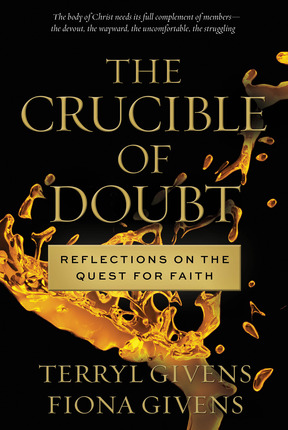Toward the end of The Crucible of Doubt, the book we have spent the last few Fridays discussing, the authors go into detail describing a period of doubt in the life of Joseph Smith.
Right before the darkness struck, he seemed poised to fulfill all the expected prophetic goals (Centerplace of Zion! Two dozen temples! Twenty thousand people converting to Mormonism!).
And then it all fell to pieces. He felt nothing when he prayed, and the heavens were silent for months as the situation in Missouri got even worse.
I found myself cheering that this story of near-despair was being told in a Church-published book without the requisite triumphalism at the end. It closes not with a miracle, or a pithy lesson like “the Church had to suffer in this way because the Lord had something even bigger and better planned for the Saints!”
Rather, it ends with Joseph weeping on the people’s behalf.
I felt so uplifted by this honesty. Why don’t we tell stories like this more often?
This week in our final discussion of The Crucible of Doubt, let’s talk about storming the heavens — apparently in vain. I’ve known plenty of Mormons who’ve left the Church, sometimes because of policies on women or blacks or gays; sometimes, though, it’s because God went AWOL with no forwarding address.
I don’t think our religion does a good job of acknowledging the regularity of dark nights of the soul, to say nothing of actually providing resources to help people understand how common (and necessary) they are.
With that in mind, here are some questions to guide our conversation in this last week:
- I was struck by the authors’ fresh interpretation of “Be not overcome of evil.” We tend to emphasize this in a finger-pointing way, not wishing to fall prey to evil thoughts or behavior. But what if instead this means instead “that as compassionate spectators we would fall prey to the weight of evil, and turn to despair hopelessness, or bitterness”?
- How do you respond when God is silent? When have you despaired of receiving an answer to prayer, or some kind of spiritual manifestation?
- Is it possible you may have missed an answer to prayer because you were expecting it to come in some burning-of-the-bosom kind of way and instead the response came stealthily? (I tend to prefer my own answers to be delivered at regular intervals by owl post, or possibly skywritten over my house, and I have certainly had times when it’s only with hindsight I can look back and see how the hand of God may have been active in my time of despair.)
- How do you respond personally when Mormons around you say they have lost their faith and are leaving the Church? How does the Church respond to people who doubt or lose heart?
My deep thanks to our regular featured commenters who have raised great questions in the past month we’ve been discussing this book: Emily Jensen, Samuel Brown, Robert Couch, Dan Wotherspoon, Rosalynde Frandsen Welch, Kristine Haglund, Brandt Malone, Heather Hardy, and Mitch Mayne.
All the posts in this series on doubt:
- Kickoff here: Mormon doubts? Let’s talk about them
- Chapters 1 & 2 discussion here: How do Mormons deal with doubt?
- Chapters 2 & 4 here: “I know the Church is true” and other Mormon muddles
- Chapters 5 & 6 here: The dangers of idolizing Mormon prophets
- Chapters 7 & 8 here: Mormonism as “the only true and living church”
- Chapters 9 to 11 here: Staying Mormon when God is silent






